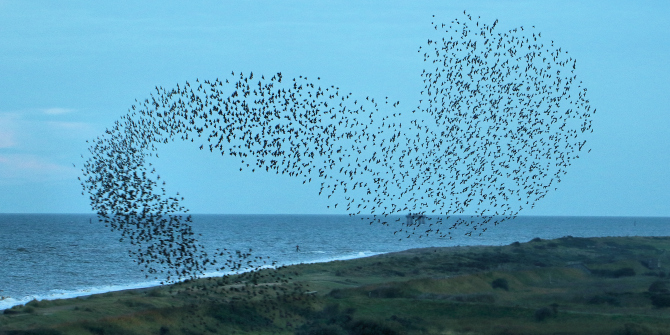 The Open Library of Humanities is an open access publishing platform for the humanities and social sciences. Key to its growth will be to convince current journals to join the platform. Co-founder Martin Eve reflects on how this might work and the range of benefits for subscription and other high cost open-access journals in making the switch. Finding ways to move APC-driven journals to the OLH is surely good for the general community perception of Open Access.
The Open Library of Humanities is an open access publishing platform for the humanities and social sciences. Key to its growth will be to convince current journals to join the platform. Co-founder Martin Eve reflects on how this might work and the range of benefits for subscription and other high cost open-access journals in making the switch. Finding ways to move APC-driven journals to the OLH is surely good for the general community perception of Open Access.
It was with great pleasure that we announced that the Open Library of Humanities now has its first journal joining that has moved away from a subscription model to a pure gold OA basis. This makes me very happy. The Journal of British and Irish Innovative Poetry is a niche publication in the humanities that holds great value to its target audience. While it was never the most expensive journal for institutions to purchase (small steps at first), to begin to offset the amount paid into the OLH by subscriptions that will no longer be needed forms part of our transition model.
In the lead-up to our launch later this year, though, we’ve had to give a great deal of thought to the types of journal that we’d like to join the platform. I wanted, here, to offer a few thoughts on the relative merits of admitting each of the following kinds of journal:
- Subscription journals.
- APC-driven gold-OA journals.
- Volunteerist gold-OA journals without fees.
Subscription journals
These are the most obvious types of journals that I’d like to see joining the OLH. Subscriptions require exclusion that sits against the often-claimed logic of inclusion fostered within the humanities. By migrating subscription journals to the platform, sharing in our economic model, we save libraries money and we allow anyone with internet access the ability to read peer-reviewed work.
 Image credit: Geisel Library at UCSD by Ben Lunsford (Wikimedia)
Image credit: Geisel Library at UCSD by Ben Lunsford (Wikimedia)
An interesting point also arises here, though: what about new journals that would have been subscription if they hadn’t started at the OLH? This has arisen in discussions with some learned societies. They want to start a new journal. They can either go to an existing publisher who will operate on a subscription basis, perhaps with a hybrid OA model, or they can come to us. Where possible, I think it’s important that we don’t simply publish “new journals” with additional costs, although the need to meet the demand for ever-more published research will remain. But, if the alternative is that this demand is met by new subscription publications, then this is a flip to OA of a journal that would have otherwise been subscription.
APC-driven gold-OA journals
Why, you might ask, should we bother converting existing gold open-access journals to the OLH model if they’re operating on Article Processing Charges (APCs)? Well, the answer is really quite simple: APCs are one of the most feared aspects of gold OA in the humanities. Scholars often have no recourse to funds and see the mode as exclusionary from the author side (not least in terms of career progression). As I also wrote in my recent book, the costs are also concentrated so that institutions do not spread risks/cost between themselves. These fees are sometimes fairly high, as well, at around the £1,500 mark. The OLH’s costs per article, met through pooling of institutional resources and done on a not-for-profit basis, are nowhere near this high, even on our expanding models of staff recruitment projected for the next few years. Finding ways to move APC-driven journals to the OLH is surely good for the general community perception of OA, is good for the affordability of OA in the humanities, and eliminates an incentive for bad practice (accepting work because you will be paid for it).
Volunteerist gold-OA journals without fees
Finally, I think it is worth pursuing the professionalisation, discoverability, preservation and sustainability of existing open-access journals that are run on a volunteerist basis. These journals often struggle to meet their own, usually meagre, costs and as a result sometimes go under when the burden gets too much. Justifying the economics of these journals seems initially harder: libraries aren’t paying for them at the moment so why should they take on the additional cost? I think it is important though. If these journals are passing academic standards and are valued by academic communities (which is what our post-launch selection procedure is meant to achieve), then the role of the library is surely in part to help in the preservation of and access to this material.
Selection and Pre-Filtering
While we’ll have more announcements soon about journals joining the platform, I thought it was worth sharing this set of rationales for the balance that we aim to pursue as the platform grows after launch. It’s also important to work out exactly who is selecting publications and on what basis. I have increasingly come to distrust our ability to accurately pre-select high-quality material for publication, which means that there must be an element of risk in acquisitions. In an OA world and through mechanisms like our joint academic and library selection procedures, we don’t fix these problems, but we are at least aiming to be transparent about the way in which we have selected.
This piece originally appeared on Martin Eve’s personal blog and is reposted under Creative Commons Attribution 4.0 license.
Note: This article gives the views of the author, and not the position of the Impact of Social Science blog, nor of the London School of Economics. Please review our Comments Policy if you have any concerns on posting a comment below.
Dr. Martin Paul Eve is a Senior Lecturer in Literature, Technology and Publishing atBirkbeck, University of London. Previously he was a Lecturer in English at the University of Lincoln, UK and an Associate Tutor/Lecturer at the University of Sussex.







1 Comments